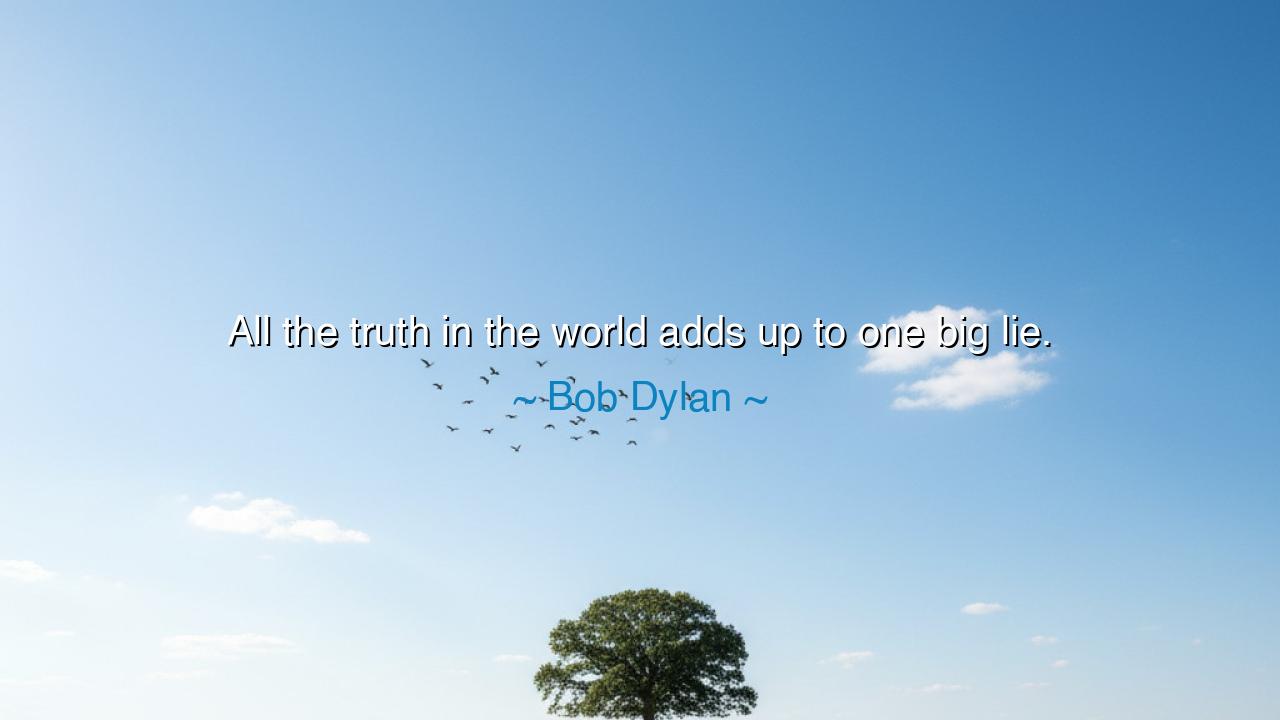
All the truth in the world adds up to one big lie.






"All the truth in the world adds up to one big lie." Thus sang Bob Dylan, poet of the restless highways and prophet of the modern age. His words sound like a paradox, yet they reveal a bitter wisdom: that fragments of truth, when broken apart, twisted, or misused, can be assembled into a structure of falsehood. Men may gather facts like stones and build with them a wall, and yet that wall may imprison rather than free. Dylan warns us that not all who speak of truth serve it; sometimes the abundance of small truths becomes the mask of a greater lie.
The ancients themselves knew this danger. Did not the Sophists of Greece pride themselves on clever arguments, piecing together half-truths until they could make injustice appear just? Socrates fought against this, reminding his listeners that truth is not merely the sum of claims, but the harmony of wisdom and virtue. A thousand isolated "truths," if arranged without conscience, can become the deadliest deception. Dylan’s words echo this ancient warning: the appearance of truth is not always its reality.
History is filled with examples. Consider the propaganda of totalitarian regimes. They often used truths—statistics of progress, records of production, images of loyalty—to persuade the masses. Each fragment might have been accurate, yet together they wove a lie that concealed oppression, violence, and suffering. Nazi Germany declared statistics of national strength while hiding the horrors of genocide. The Soviet Union boasted of industrial triumphs while silencing the starving. Here we see Dylan’s warning fulfilled: when truth is fragmented and bent to power, it becomes the seed of one great falsehood.
Or think of the tobacco industry in the twentieth century. For decades, it paraded small truths—that smoking was pleasurable, that many lived long lives despite it, that no single study could "prove" the danger. These pieces of truth, artfully arranged, created the lie that smoking was harmless. The world, persuaded by fragments, ignored the larger truth of harm. Thus Dylan’s words ring again: the fragments of truth, if not guided by honesty, may add up to a monstrous lie.
The lesson is not to despair of truth, but to approach it with discernment. It is not enough to collect facts, for even facts can be twisted into deception. We must seek the deeper coherence, the integrity that joins truth into wisdom. Dylan’s paradox urges us to look beyond appearances, to ask: what story is being told with these truths? Are they serving justice, or hiding it? Are they opening the way to freedom, or paving the road to slavery?
Practically, this means we must become guardians of discernment. Do not accept claims simply because they contain fragments of truth. Ask who assembles those fragments, and for what purpose. Seek the broader vision, the pattern beneath the facts. Cultivate the humility to question, and the courage to name the lies even when they are dressed in the garments of truth. In doing so, you protect not only yourself, but the community that depends on your voice.
So remember, children of tomorrow: "All the truth in the world adds up to one big lie" when truth is stripped of honesty and used as a weapon of deception. But when truth is gathered with integrity, guided by conscience, it becomes light that no lie can quench. Let Dylan’s words be both a warning and a summons: seek not just the fragments of truth, but the living whole, and guard yourself from those who would weave truths into chains. For the greatest lie is built not of shadows, but of truths misused.






NVNam Van
I find Dylan's words both profound and unsettling. If truth can add up to a lie, does it imply that our understanding of the world is always clouded, no matter how much we seek the truth? Is it possible that we are always chasing after something that, once understood, turns out to be more complicated or flawed than we ever imagined? How do we deal with the discomfort of knowing that even truth may not be as solid as we think?
DMNguyen Duc Minh
Dylan’s quote seems to suggest that truth is both elusive and paradoxical. The idea that ‘all the truth in the world’ can still add up to a lie implies that the truth can be distorted or incomplete. But how do we reconcile this with the need for truth in our daily lives? How do we search for meaning and understanding in a world where the truth is constantly shifting and, in some ways, impossible to pin down?
TL27.tran thanh lenh
This quote leaves me wondering whether truth is something we can ever truly grasp. If all truths are fragmented and, in the end, form one ‘big lie,’ does that mean there’s no absolute truth? Or could it mean that truth itself is elusive, always slipping through our fingers? Could it be that the more we try to gather the pieces, the more we complicate what is ultimately unknowable?
Нɴнuɴԍ ɴԍoc_
Dylan’s statement feels like a reflection on the limits of truth in a world full of conflicting narratives. If all the facts add up to one big lie, does that mean truth itself is subjective? Is it possible that each person’s ‘truth’ creates a distorted version of reality, and that perhaps no single truth can fully capture the essence of life? How do we navigate through all these truths to find clarity?
TNThanh Nhan
Bob Dylan's quote seems to touch on the idea that even when we have all the facts, they might still fail to convey the whole truth. Could it be that we rely too heavily on facts to understand the world, and in doing so, we miss the deeper complexities that cannot be captured by simple truths? How often do we accept what seems true without questioning if there’s a larger truth beyond the sum of its parts?